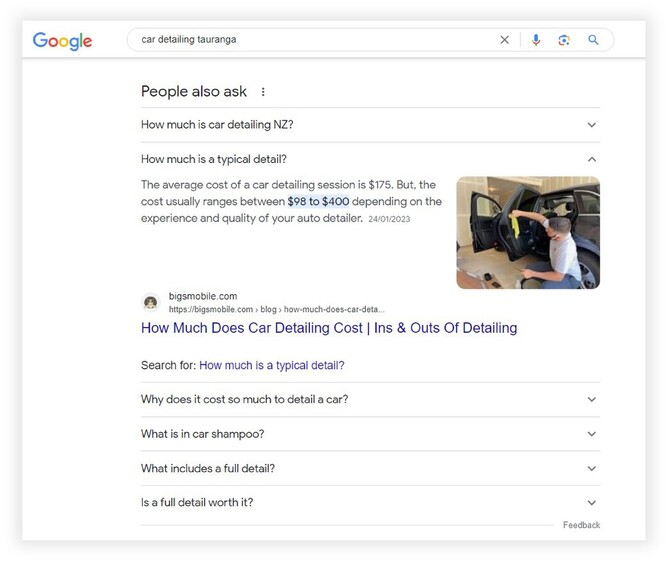Congratulations, you've got a brand-new website... now what?
So, you've got a brand-new website, finely tuned and optimized to perfection.
However, in the dynamic world of the internet, having an optimized website is just the beginning. To maintain and improve your search engine ranking, you need to continuously enhance your online presence and engage your audience.
In this guide, we'll look at ten essential strategies that go beyond initial optimization, ensuring your website continues to climb the ranks and capture the attention of both search engines and your target audience.
These ten strategies will serve as your roadmap for keeping your website's rank on the upward trajectory and solidifying your position as a trusted source in your niche.
1. Consistently Add Quality Content That Addresses Frequently Asked Questions
Regularly update your website with well-researched articles that provide answers to the questions and concerns your target audience most frequently raises. What are their questions though?
When you perform a Google search, you'll notice a "People Also Ask" section with related questions. These can be a valuable source of content ideas.
Study your competitors' content. Look for popular topics and questions their content addresses. This can help you identify gaps or areas where you can provide better answers.
By addressing their needs, you establish trust, authority, and a loyal readership, which can boost your website's visibility and credibility.
Business coach, Alex Hormozi says, “if they will spend time with you now, they will spend money with you later!”
2. Add Real Value
When adding new articles, prioritize delivering real value to your audience. Avoid creating content just for the sake of filling space.
Provide accurate, up-to-date information and practical solutions to your readers' problems.
Aim to educate, entertain, or inspire your audience with every piece of content, ensuring they come away with something valuable.
Avoid fluff and filler content that doesn't contribute meaningfully to the reader's knowledge or experience. Instead, focus on substance and depth in your articles.
Valuable content not only enhances your website's credibility but also encourages readers to return for more, share your content, and engage with your brand.
3. Implement Provided Keywords from Your SEO Professional
Incorporate the specified keywords provided by your SEO professional seamlessly into your articles. These keywords are strategically chosen to improve your website's search engine ranking.
Ensure the keywords are used in the article's title, subheadings, and throughout the article.
Don't forget to mention the towns and cities you serve.
Include your keywords in natural ways that make sense to the reader. Don’t force it. In fact, think about alternative yet related words or phrases that naturally complement your main topic.
Avoid overloading your content with keywords. Prioritize writing for your audience, ensuring your content flows smoothly.
4. BUT: Write About Topics, Not Just Keywords
Shift your focus from keyword-driven content to providing comprehensive information on relevant topics.
You know your topic, so when you write, pretend you are talking to a customer. How would you answer their question?
Address the questions and needs of your audience within the content, rather than solely concentrating on keyword placement.
Craft content that genuinely educates, informs, and engages your readers, making it a valuable resource.
5. Make Content Relevant with Stories and Photos
Weave your first-hand experience and real-life examples into your content. Stories resonate with readers and make the information relatable.
Incorporate your own photos that enhance the content, provide visual context, and engage the audience.
Keep the balance between text and visuals for a well-rounded and appealing presentation.
This approach not only keeps your content relevant but also captures the interest of your audience through storytelling and visually appealing elements.
Pearcy's Detailing in Tauranga have a wealth of photos that demonstrate their real-life, first-hand experience and results.
6. Craft Compelling Titles to Hook Readers in
Create article titles that pique the reader's curiosity and interest. The title is the first thing readers see and can determine whether they click to read more.
Use attention-grabbing words, questions, or powerful phrases that directly relate to the content.
Keep titles concise though, typically under 60 characters.
Experiment with different title styles, but ensure they accurately represent the content within the article.
A compelling title can significantly increase the click-through rate and the overall success of your content.
7. Optimize Internal Linking
Add hyperlinks to key pages on your website, such as the home page, as well as product and service pages. This tell Google which pages are important.
Don’t overdo it though. Over time you will likely cover all important pages naturally.
Link to (and from) other articles on your website, guiding readers to additional helpful information.
Ensure that the anchor text (the text used for the link) is descriptive and relevant to the linked page's content.
8. Share Articles on Social Media
Utilize your social media channels to promote newly published articles.
Craft engaging and concise social media posts that highlight the article's main points and benefits.
Schedule posts at optimal times when your target audience is most active on each platform.
Encourage sharing and engagement by including visuals, questions, and relevant hashtags.
Engaging on social media amplifies the reach of your articles, driving more traffic to your website and increasing overall visibility.
9. Keep It Fresh with Diverse Content
Introduce variety into your content by including product reviews and comparisons. This keeps your content portfolio engaging and informative.
Conduct product reviews to provide in-depth analysis and insights, helping readers make informed decisions.
Create comparison articles (this vs that, top 5, etc) that evaluate different products or services within your niche, highlighting their pros and cons.
10. Use Real-Life Case Studies to Demonstrate Expertise
Leverage real-life case studies, client success stories, or personal experiences to showcase your expertise and the practical applications of your knowledge.
Share the challenges, solutions, and results in a detailed and transparent manner.
Case studies provide tangible evidence of your capabilities, build trust, and serve as valuable resources for your audience.
Highlight your problem-solving abilities, which can set you apart as an authority in your field.
Demonstrating expertise through case studies adds a layer of authenticity and credibility to your content and can significantly boost your reputation in your niche.
Don't have time? I can help
I am happy to keep providing content on a regular basis if that makes your job easier. Phone
Get in touch and we can discuss the best way to move forward.



